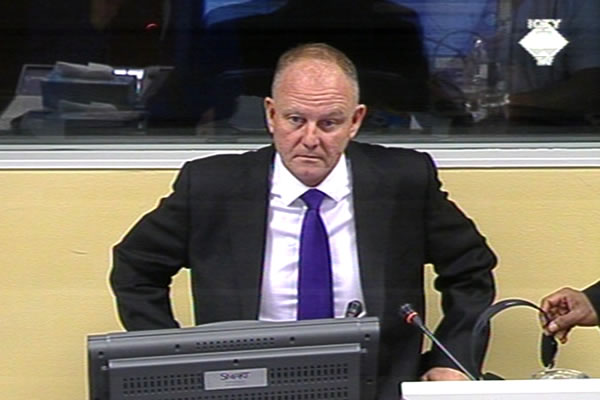Home
WHY NATO AIRCRAFT DIDN’T BOMB BOTH SIDES?
Recalling that in September 1994 NATO aircraft bombed Bosnian Serb positions around Sarajevo, Ratko Mladic’s defense counsel asked the former deputy commander of UNPROFOR in BH if he and other high-ranking UN officials had ever called in NATO strikes against the BH Army. The defense argues that the BH Army was also responsible for some of the incidents. As the witness explained, no air strikes were called in because the actions of the government troops ‘never escalated to a level that would warrant a military intervention’
 David Fraser, witness at the Ratko Mladic trial
David Fraser, witness at the Ratko Mladic trial Defense counsel Ivetic tried to exonerate the VRS and its commander, the accused Ratko Mladic, from responsibility for the crimes in Sarajevo by shifting the blame on the BH Army for ceasefires violations, attacks on UN vehicles and artillery and sniper attacks on the city. In the cross-examination of Canadian general David Fraser, the defense counsel put it to the witness that UNPROFOR was biased because it didn’t respond in the same way to the incidents caused by the BH Army and the Bosnian Serb army. From April 1994 to late May 1995, the witness served as the assistant to the UNPROFOR commander in Sarajevo.
Today, the defense counsel referred to an interview between British general Michael Rose, former UNPROFOR commander in Sarajevo, and the OTP investigators in The Hague. In the interview, Rose said that Ejup Ganic had recruited the secret police to open sniper fire on trams under an angle which would make it possible to blame the Serbs for the incidents. Canadian general Fraser replied he had no knowledge of that. The defense counsel put it to the witness that civilian casualties in trams could have been caused by stray bullets during firefights. The witness said that he couldn’t rule out the possibility. Fraser also agreed that the BH Army had snipers on the UNIS building and the Executive Council building. UNPROFOR sent letters of protest to the Sarajevo authorities when fire was opened from those locations on Serb civilians, Fraser insisted.
In his evidence at the trial of the former commander of the Sarajevo-Romanija Corps Dragomir Milosevic, Fraser said that UNPROFOR had on one occasion reported that two shells had been fired on a Sarajevo residential zone; one shell had been fired from Serb positions and the other from the Muslim side. Today Fraser confirmed that both shells caused civilian casualties.
The defense counsel also noted that UNPROFOR suspected that in April 1994 VRS soldiers had killed a French soldier in the so-called Sniper Alley, but also that the BH Army was responsible for the death of another Frenchman at the Sarajevo airport and that Muslim soldiers had fired several rounds that hit the vehicle in which UNPROFOR commander was travelling in November 1994. Luckily, there were no casualties in the second incident. The witness agreed with the allegations, but insisted they were duly reported by UNPROFOR.
At UNPROFOR’s request, NATO aircraft bombed Serb positions around Sarajevo on 22 September 1994. This prompted the defense counsel to ask the witness if he and his superior commander in UNPROFOR had ever called in air strikes against BH Army positions. General Fraser replied they didn’t. The incidents caused by the government forces operating from the city never ‘escalated’ to the level that would warrant a military intervention, the witness said. The defense counsel then asked the witness if they even threatened the BH Army with air strikes to reduce the number of incidents. The witness said it was difficult to define military targets in the city and UNPROFOR never made ‘false threats’.
The Canadian general will complete his evidence tomorrow. After that the prosecution will call a new witness.
Linked Reports
- Case : Mladic
- 2012-12-05 VRS ‘DELIBERATELY TARGETED’ CIVILIANS
- 2012-12-03 SNIPER AND ARTILLERY TERROR IN DOBRINJA
- 2012-11-22 ‘ADJUSTING’ MORTAR FIRE
- 2012-12-10 CHALLENGING ORIGIN OF FIRE IN SARAJEVO
- 2012-12-11 UNPROFOR OFFICER: MLADIC HAD FULL CONTROL OF VRS
- 2012-12-13 1,200 SHELLS A DAY HIT SARAJEVO ‘ON AVERAGE’
